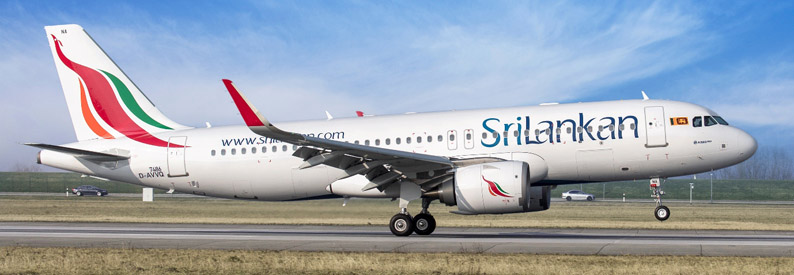SriLankan Airlines' A320/A321neos lose ETOPS certification
The Civil Aviation Authority of Sri Lanka (CAASL) has suspended the ETOPS certification of A320neo and A321neo aircraft operated by SriLankan Airlines (UL, Colombo Int'l) following a mid-flight engine shutdown in January 2018, The Sunday Times has reported.
According to documents obtained by the newspaper, the regulator stepped in after a maintenance lapse led to a single-engine emergency landing of an A321neo 4R-ANE (msn 7891) in Bangkok Suvarnabhumi on January 22, 2018. Reportedly, the technicians had released the unit prior to the flight despite having detected debris in the oil monitoring system of the CFM International LEAP-1A32 engine.
Following the incident, the CAASL ordered SriLankan Airlines to operate their Airbus neo twinjets within a 60-minute diversion range, effectively blocking the type's operation over the Bay of Bengal (en-route to South-East Asia) or the Arabian Sea (en-route to the Middle East).
The regulator has said in a letter to SriLankan Airlines that it did not find any cogent reason for the decision to release the aircraft to operate the flight without further technical checks. It has thus established that the incident was "totally preventable".
“In this instance, the [engine] manufacturer raised an urgent work card but the relevant department did not give due recognition to it and released the aircraft for commercial flights," the CAASL has said. Reportedly, the engine manufacturer alerted the carrier already on January 5 but SriLankan only conducted a thorough inspection on January 19, arguing that the aircraft had been unavailable for maintenance earlier due to "engagement in commercial flights".
During follow-up audits, the CAASL has established that the "lackadaisical" approach of SriLankan Airlines to maintenance has not been rectified yet and, as such, the carrier's ETOPS certification for the neo Family aircraft will continue to be suspended.
The CAASL has further clearly stated that the mid-flight shutdown did not occur due to any manufacturing defects but solely because of SriLankan's negligence.
Flightradar24 ADS-B data shows that the affected aircraft has returned to Colombo Int'l on January 31 and has been in normal operation ever since.
According to the ch-aviation fleets module, SriLankan Airlines currently operates two A320neos and three A321neos, with a further unit of the latter type poised for imminent delivery.
The debt-ridden Sri Lankan flag carrier currently deploys its A320neo and A321neo aircraft out of Colombo to Abu Dhabi Int'l, Bahrain Int'l, Bangkok Suvarnabhumi, Doha Hamad Int'l, and Dubai Int'l, among others. All these flights, normally operated over the Bay of Bengal or the Arabian Sea, now have to follow routes along the coast of India, thus adding additional flight time. Services to India, Bangladesh, Pakistan, and the Maldives are not affected by the suspension of the ETOPS certification.
The limitation is one of the reasons for SriLankan's rapidly worsening punctuality. According to The Sunday Times, in February 2018 less than 70% of all carrier's flights departed Colombo on time with a total of 911 flights delayed by more than 15 minutes.
According to documents obtained by the newspaper, the regulator stepped in after a maintenance lapse led to a single-engine emergency landing of an A321neo 4R-ANE (msn 7891) in Bangkok Suvarnabhumi on January 22, 2018. Reportedly, the technicians had released the unit prior to the flight despite having detected debris in the oil monitoring system of the CFM International LEAP-1A32 engine.
Following the incident, the CAASL ordered SriLankan Airlines to operate their Airbus neo twinjets within a 60-minute diversion range, effectively blocking the type's operation over the Bay of Bengal (en-route to South-East Asia) or the Arabian Sea (en-route to the Middle East).
The regulator has said in a letter to SriLankan Airlines that it did not find any cogent reason for the decision to release the aircraft to operate the flight without further technical checks. It has thus established that the incident was "totally preventable".
“In this instance, the [engine] manufacturer raised an urgent work card but the relevant department did not give due recognition to it and released the aircraft for commercial flights," the CAASL has said. Reportedly, the engine manufacturer alerted the carrier already on January 5 but SriLankan only conducted a thorough inspection on January 19, arguing that the aircraft had been unavailable for maintenance earlier due to "engagement in commercial flights".
During follow-up audits, the CAASL has established that the "lackadaisical" approach of SriLankan Airlines to maintenance has not been rectified yet and, as such, the carrier's ETOPS certification for the neo Family aircraft will continue to be suspended.
The CAASL has further clearly stated that the mid-flight shutdown did not occur due to any manufacturing defects but solely because of SriLankan's negligence.
Flightradar24 ADS-B data shows that the affected aircraft has returned to Colombo Int'l on January 31 and has been in normal operation ever since.
According to the ch-aviation fleets module, SriLankan Airlines currently operates two A320neos and three A321neos, with a further unit of the latter type poised for imminent delivery.
The debt-ridden Sri Lankan flag carrier currently deploys its A320neo and A321neo aircraft out of Colombo to Abu Dhabi Int'l, Bahrain Int'l, Bangkok Suvarnabhumi, Doha Hamad Int'l, and Dubai Int'l, among others. All these flights, normally operated over the Bay of Bengal or the Arabian Sea, now have to follow routes along the coast of India, thus adding additional flight time. Services to India, Bangladesh, Pakistan, and the Maldives are not affected by the suspension of the ETOPS certification.
The limitation is one of the reasons for SriLankan's rapidly worsening punctuality. According to The Sunday Times, in February 2018 less than 70% of all carrier's flights departed Colombo on time with a total of 911 flights delayed by more than 15 minutes.


No comments:
Post a Comment